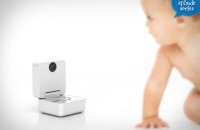The Boob Group
Breastfeeding Challenges: When Babies Bite
[00:00:00]
Please be advised, this transcription was performed from a company independent of New Mommy Media, LLC. As such, translation was required which may alter the accuracy of the transcription.
[Theme Music]
PRIYA NEMBHARD: Ouch! That’s what I think of when I think of our next topic! There is nothing more rewarding than looking down on a sweet, smiley face while you breastfeed! But then one day it happens! Your baby is teething and you are the ultimate chew toy! Now, that’s smiley face is accompanied by a little giggle, because you yelled out from a bite! Today we are discussing breastfeeding challenges and when babies bite. We are The Boob Group!
[Intro/Theme Music]
PRIYA NEMBHARD: Welcome to The Boob Group! We're here to support all moms wanting to provide breast milk to their babies. I am your host – Priya Nembhard. I am also the founder of the “Moms Pump Here” nursing locator app which helps moms all over the world to find places to pump and breastfeed their babies. If you haven’t yet, we encourage you to download the New Mommy Media Network app which gives you easy access to all our episodes. You can also subscribe to our podcast through iTunes so our latest episodes download to your mobile device automatically. And if you are on iTunes, please leave us a review, so other moms can learn about us. Ok, let’s meet the mamas joining our conversations today! Tell us a little bit about yourself and your family!
RACHEL JACKSON: Hi, everybody! I am Rachel Jackson. Priya, thanks for having me on this great show and such an important topic! I am the president founder of Rachel’s Remedies, LLC and I invented a moist heat or cooling device for breastfeeding moms to help solve all kinds of problems, including the pain from a sweet, biting little baby. So, when I was nursing my babies I had all these very painful and common conditions, and quickly found there is no treatment on the market. So I invented Rachel’s remedy breastfeeding relief pack to solve that problem.
ANDREA MITCHELL: Hi! I am Andrea Mitchell. I do not have any inventions under my belt, but I do have two boys.
PRIYA NEMBHARD: Those are your inventions!
ANDREA MITCHELL: My oldest is almost two years old, and I never actually went through any teething issues with him. And did have to wean when I became pregnant with my youngest who will be six months tomorrow, and he is actually very much going through teething right now! Two bottom teeth have already cut through, and top four are presently making their way out. So I get bit a lot!
SUNNY GAULT:And I am Sunny! I am producing today’s show! And I do have some experience with this. Maybe not as much as most of the mamas on today’s show. But I have four kids and I breastfed all of them, I pumped a little bit for all of them. And I…You know, as far as biting is concerned… You know, maybe a little bit, I would say, with my first two. I really didn’t make it far enough in the…I think the breastfeeding process as far as you know, breastfeeding for six months, or whatever. I think they say it is about the sixth month mark is when, you know, this can happen depending on when your kids get their teeth. And by that point with my two boys, we were kind of transitioning and doing a lot of supplementation, and they were doing a lot more bottle stuff. So I didn’t really experience it with the boys. My last two are girls, and they are twins. So I breastfed, still kind of breastfeeding them, I don’t know…still lactating though. And it’s been almost three years. And so for them, a little bit more biting, but I never… You know, Priya, when you were talking in the intro, you know, they bite and then they look at you and smile. I never went through that with them. I truly do believe that any of the accidental biting were just that-accidental and I were like: what are you doing? Don’t do that again! It was not, you know… Literally: do not bite the hand that feeds you! And so once I kind of made that distinction, any other biting was just, you know… I just think they were accidental. So never had the cute, little "haha mama, I am going to go get you” kind of thing. But yes, I have felt the pain of biting, but it’s been minimal. Yeah!
RACHEL JACKSON: I have two boys, and my first: similar. I had no real issues with. But with my second, and his personality is still like this… He is doing all the things that you read about with biting. Because there are a lot of different reasons babies bite, or a few different reasons babies bite. And one of them is when they are first teething and it hurts, and so they are looking for ways to sue, you know, that pain.
But then the other is to get your attention. And that’s the real one that feels so intentional, and makes…you know, you get mad, like: no, that’s bad! But I did all the wrong things, because I didn’t know what to do at the time. Now I know, so it’s easier for me to tell people what to do. And so one of the things I would say is don’t scream, which is like the hardest thing not to do. And that’s exactly what I used to do. Because it can really scare them, and they can go on a nursing strike, you know, if they are sensitive babies, but it’s… What I ended up having to do to stop the biting, was I had to put down my phone, turn off the TV, you know, and just really make the eye contact, and make them know you are right there, because they wanted the attention.
PRIYA NEMBHARD: Mhm, absolutely! Absolutely! And hi, mamas, I am Priya! I am your host and I also have three children. And my oldest is now 14, but my youngest Liam…I breastfed him until he was three, so he had plenty of teeth! And I had the giggles. And I had the moments where I just freaked out. And I remember so clearly how numb my nipples were… Like at some point, when he stopped breastfeeding, I remember the numbness so clearly, and wondering: when are they going to bounce back? Cause I felt nothing! So welcome, everybody! I am so glad all of you could join us today for this conversation!
[Theme Music]
SUNNY GAULT:Alright, so let’s talk about a news headline, before we dive into the main part of the conversation today. I like to highlight moms that are doing some amazing things. Even in the moment if they don’t realise they are doing something amazing, I think we need to get the word out about this kind of stuff! And this story, you guys may have heard of it, but it’s about a mom who is doing a half-marathon. She is a breastfeeding mom. And basically she needed to pump. She needed to express her milk, while she was doing a half marathon. And she literally did that! She slowed down her pace. I don’t know how she got the pump. I don’t think that the…
PRIYA NEMBHARD:She probably had it in her backpack or something.
SUNNY GAULT:Yeah, but can you imagine running with that?
RACHEL JACKSON: No!
ANDREA MITCHELL:No!
SUNNY GAULT:Like just one more thing you have to run with…
ACHEL JACKSON: I mean, I can’t even imagine running, let alone doing it… (inaudible)
SUNNY GAULT:Well, somehow she was able to hock this thing up. And she quit running and was just walking at a breast pace, and started pumping, and still continued with the marathon, the half-marathon I guess, and then finished it up. But this is… I think this is such an amazing story! She had no intention for this to like get out and be such a big thing. But she said people were just kind of passing her, and she was just kind of doing her thing, other fellow people were cheering her on… And you know, this is such a good example of life happens, and we as moms, just kinda have to adapt. And this is the ultimate form of adapting! I mean, you think about running a half-marathon…everything is about speed, right? Her, having to slow down to do this, you know, really said something. So what do you guys think? Priya?
PRIYA NEMBHARD:Well, I have to command her! Cause I’m thinking about the hand-eye coordination. Like, you have to stay in this mindset, and stay focused on what you are doing, especially if you wanna make a certain time, if you running a marathon. But then she had to do an extra amount of planning! Like: ok, what am I gonna do? What if I get really engorged? There’s no way I am gonna be able to… Like, you have to think about all these things that probably went in her mind before the actual marathon. Like: how do I prep for this? Oh, my God! And I have the pump…Oh, well, screw everybody! I am gonna weep it out anyway! Like she had to have these thoughts in her mind before, like: this is gonna be my plan! So I think she is definitely a rockstars for doing it!
SUNNY GAULT:Right?
RACHEL JACKSON: To me, she is Wonder Woman! I mean, I just think that that is incredible! It’s so hard to pump, even when you are at work worrying about someone walking in, or you know, just the stigma of it… And for her to have that kind of courage is exactly what we need to you know, get it out there, and get more women more comfortable with it. And I love the reaction from everything that I’ve seen in the news that is so supportive! And everyone is looking up to her, and it is just awesome!
ANDREA MITCHELL: I hadn’t even heard this story, until you had it here. And as you said, I think Priya, I think you just said about pumping at work. Like, I can’t even coordinate it at work, never mind while running! That would be just impossible and blows my mind! So good for her!
SUNNY GAULT: Yeah, yeah! It’s really cool! And she does say that, you know, her whole goal with this, was to empower moms not to be afraid to nurse in public. This takes it to a whole other level; it’s not just nursing in public!
ANDREA MITCHELL:I feel inadequate now, that she did that, and I have a hard time sometimes doing my stuff…
SUNNY GAULT: Well, it makes you wonder if she had some stuff, even…you know, kind of can figure it already, cause this article, this particular one, maybe there’s another one that kind of goes more into detail, but how would you do that hand off? You know, I am thinking, maybe she already had on some sort of pumping tank… I mean, this obviously wasn’t just out of the blue! She did have to have some planning with this! Maybe she had some stuff already hocked up, so it was just a matter of just, you know, kind of you know, hocking just the whatever, the tubes and stuff to the actual pump machine. But then… Again, walking around with a pump! Like, you know what I mean? That’s just extra weight!
PRIYA NEMBHARD: And you know, I’ve done a couple marathons. And you have… There’s rubbing that goes on between your nipples and your clothes when you are running, so you have to put tape over it. So how did she manoeuvre that? I don’t know…
SUNNY GAULT: We have a lot of questions for her!
ANDREA MITCHELL: If you ever find her, have her interviewed, like to tell everybody how she did it!
SUNNY GAULT: I know, right? Well, her name is Anna Young. She is out of Utah. And so I don’t know… Maybe we’ll try to track Anna to on the show. Because she definitely has a great story to share!
[Theme Music]
PRIYA NEMBHARD: Today we are talking about breastfeeding challenges when babies bite! So I can’t think of more painful topic of this one! I almost laugh at myself thinking of how happy my babies were when they bit me while nursing and laughed to my reaction. So what were your challenges when your babies were breastfeeding and they bit? Like, how did you approach that?
ANDREA MITCHELL: I mean, currently right now, every time I get bit by… Bradley is my youngest. So every time he bites me, it is typically like I will be looking at my toddler, looking at my phone or something. So I will stop doing what I am doing, and I will look at him. And then even if I look away even for a split second, he does it again and laughs at me. So it is about that attention thing. But I still can decide if I think it’s attention, or teething, or both. Because he is in that face where it doesn’t matter what he has in front of him, he’s immediately trying to take it and chew it. So it might be a little bit of everything.
PRIYA NEMBHARD: He may just think it’s really funny.
ANDREA MITCHELL: Oh, he does find it hilarious. He does like my reaction when I say: “oh!”, and when I say: “no!”. I’ve had to put him down and let him scream for a while, and I hate doing that, it breaks my heart, but I haven’t had a choice, cause of how much he’s bit me. He did draw blood once.
RACHEL JACKSON: Ouch!
PRIYA NEMBHARD: Ouch!
RACHEL JACKSON: One of the things that I did that I found really worked, helped a lot, was really turning down the lights, minimizing the distractions. And like I said before, having to you know, put down all the stuff that got me through nursing so many times when I would sit there and having to just stare, you know. But just that… The pain wasn’t enough to make me that worry about me being bored, you know, wanting to return e-mails or whatever. And so just staring into each other’s eyes and really watching for the queues, cause you can get those queues when he starts to get distracted, or when he doesn’t as hungry anymore, get that boob off of him, because he is about to bite you!
PRIYA NEMBHARD: Yeah, those queues are so important! Oh, my God!
RACHEL JACKSON: They really are! And if you are able to, you know, get rid of the distractions enough to really watch and notice them, I think that it can make the biting stop faster.
ANDREA MITCHELL: Well, and putting down the electronics and shutting everything off, that’s easy. It’s the telling the almost two year old to be quite, that’s impossible! And especially when he is climbing on the coffee and doing things that he shouldn’t be doing, and I am trying to ask him to stop, and then I have the other one biting me at the same time so…
RACHEL JACKSON: Right! Yeah! So I guess part of it for you, and I guess a lot of other women have that challenge too, is that you can’t just shut up the distractions when you have a toddler right there. So what can you do to keep that toddler busy and quite time, you know, and so you have to double plan for that, and try to think of things to keep that little one busy too to save the health of you nipples.
PRIYA NEMBHARD: I just power through breastfeeding when he was biting, because I just had to get through it. I wasn’t thinking… And plus I had two young kids at the time, Gina was five, and Eva was four. So I mean, my memory is a little shut, but I know there must have been times when I screamed at them to stop doing stuff, or you know, trying to manoeuvre, you know, walking around, holding Liam and breastfeeding while I was trying to do things with them. So that allowed him to bite more. So it was about me just powering through it, and getting through it basically. Not that I recommend it to every mom, but…you know, had to do what I had to do basically.
RACHEL JACKSON: Yeah, and I mean, it also helps if you know all the things that you can at least try to make it stop faster than you know, try them all, because the faster you can get that baby to stop biting, the better. And I mean, I really found that when I screamed, it did not have… Even though, like, in that moment he let go and he looked scared, but everything I’ve read about it, is the negative reinforcement, it is not good for them, it doesn’t really teach them the right message. And it hurts them, they cry, you know, and they are scared. So the best thing you can do is really use your pinky to get them to unlatch, and remove them, and say: I am not going to…we are not going to nurse, no bite. And they learn. Babies can learn, that’s the important thing.
PRIYA NEMBHARD: So did it affect your breastfeeding patterns at all?
RACHEL JACKSON: Oh, my God, yes! I mean, I went from a…I am a huge multitasker, so I would literally have an entire office settle up around my breastfeeding. In my lab I had my laptop, and I had my phone there, I had notepad. And so I had to…little by little I had to (inaudible) it down and do… I really fed him when I knew he was hungry, like I would give him… This is a good trick! I always gave him a teething toy before I nursed, and if…
This is a good sign. If he is chewing on it like crazy-it’s a teething thing, and if he starts sucking on it, and giving you real hunger signs, then he will nurse. And would like make sure that his latch, it was a deep latch, because if you have a deep latch, they can’t bite your nipple, and if they are nursing they can’t bite you nipple. So I would start putting away those electronics, and then start looking for the sings that he was getting full or slowing down on his sucking, because then, you know, that’s when he would start to bite. So I would go for like a really lit room, with a million electronics and things going on, to basically the, you know, 1900: no electricity, and just sitting there in the dark.
PRIYA NEMBHARD: Again: you got to do what you got to do, right?
RACHEL JACKSON: Yeah, you got to do it!
ANDREA MITCHELL: What about teething toys? There’re really good ideas! I never even thought of that!
RACHEL JACKSON: Yeah, and you can really see the signs. If he is just (inaudible) on it, but, you know, he is hurting, and he just…that’s what it’s about.
PRIYA NEMBHARD: Did it affect your breastfeeding pattern at all?
ANDREA MITCHELL: I mean, it has a little bit. I feel like it’s kind of affected my supply a little, just with the… you know, just the…he has to remove everything in order for me to keep making it. But other that, I don’t think it has as much, except for me having to put him down, and make sure that he waits a little bit to know that it’s not ok to bite mommy over and over again. And I am just wondering now, thinking back, if I just had…If my oldest wasn’t at that point yet…because I was very distracted with him. When I was breastfeeding him, I was finishing grad school, and doing work, so I was constantly connected and typing when I was breastfeeding him. But I think I officially stopped with him when he was around eight or nine months. So I feel like he was old enough that he… Not that I am happy that he didn’t, but he should have been at the point of biting.
RACHEL JACKSON: Yes, some babies just don’t bite, which is a beautiful thing! But the important thing, and the message that I would like to get across to women, that are going through this, or that are scared of this, is that it really doesn’t have to last very long. And you should try and power through it, like Priya said, because the recommendation is to breastfeed for at least a year. So if you quit at that six month mark, because of just the biting and not for other reasons, like I am not judging anybody for the (inaudible) of breastfeeding, but if that’s why you are quitting know that’s going to end soon, and that it doesn’t last for the rest six months. It really does end!
PRIYA NEMBHARD: So now that your child is biting while breastfeeding, what can mamas do to sue the pain or divert the biting? We’ll be right back!
[Theme Music]
PRIYA NEMBHARD: Welcome back! Today we are talking breastfeeding challenges and when babies bite. Ok, so what are some methods you used while your child was biting as you nurse? I know we sort of touch upon it in the first half of this episode, but did you seek…did you seek assistance? What are some tips you can share with moms listening today?
ANDREA MITCHELL: I mean, so far, other than this, I actually really haven’t really looked anything up, or asked anybody an advice about it, which I probably should have. So I am getting a lot of good ideas right now! So thank you, everybody, for all the ideas so far!
RACHEL JACKSON: Oh, good! And hopefully you’ll get more too!
ANDREA MITCHELL: Yeah!
RACHEL JACKSON: I…You know, for me the biggest things that I hear from my…all my customers, and all the women that I talk too, the most effective things are to really watch for those signs of boredom, or attention, you know, wanting attention. And there are signs, like if they start kind of kicking with their feet, or fidgeting, or just trying to get your attention in any way and slowing down on the nursing. Those really important signs to watch for and you can break the latch before you get that bite.
PRIYA NEMBHARD: Yeah! Just be gentle with your baby’s first and foremost. You know, the first reaction when it…the first time it happens, you are going to have that: “ouch!” moment, but afterwards, we just have to be more conscious. And of course, you know, looking for the signs. But our reaction…we just need to be gentler with our babies from that point on.
RACHEL JACKSON: I totally agree! And I mean, just try so hard not to scream or yell. And some babies think it’s funny when you do that, and then they do it again, because they want to see your reaction.
PRIYA NEMBHARD: Yeah, they laugh…
RACHEL JACKSON: Yeah! So some are going to think it’s funny. Some are going to be incredibly hurt, because they are sensitive, and scared, and could go on a nursing strike, so could have a bad reaction to it. So yeah, just say in a soft voice: “no biting, no biting”, and that’s what you got to do over and over again.
PRIYA NEMBHARD: And the positive reinforcement?
RACHEL JACKSON: Yes!
PRIYA NEMBHARD: So, you talked about a negative reinforcement last time. What are ways moms can implement positive reinforcements? So, if the baby latches correctly… So, you are in the middle of a breastfeeding and then here she might bite a little bit, and then you will pull away your nipple, and just give it a pause, you pause for a second. And then the baby latches back on.
You can, you know, praise your baby and say: "oh, my God, that was such a great job""good job, baby" you know "great latch" or whatever you need to say just to offer that positive reinforcement. Even your facial expression, because that’s what they are looking for also. That’s why they laugh when you react like this.
RACHEL JACKSON: That’s why they laugh, that’s right! There are so many studies that show that that positive reinforcement that babies especially… I mean, at every age we all learn from positive reinforcement. But at that age, you baby wants your positive reinforcement more than anything in the world. And it means so much. And it’s so powerful.
PRIYA NEMBHARD: Yep! Absolutely! Also another great tip is distracting your baby. So, you know, we talked about using the chew toy before, to, you know, off-set the biting, but even having like other toys around, or you know, I don’t want to even say having your phone around, cause you should be focusing on the baby. But just having other things around, you know, even a book with pictures, you know, you are showing the baby the book with your other hand, multitasking. Just look for other things to distract your baby so they don’t bite down as hard, or they could look away for a second before they bite. Things like that would be awesome. Do you guys have any more tips in your experience?
RACHEL JACKSON: Oh, yes! That teething toy we talked about is a great thing to use before and after. Before to just kind of gage if your baby is really hungry, and then after if you do…if your baby does bite, to immediately give your baby a chew toy, you know, whether it’s a (inaudible)thing, or whatever, some sort of teething toy.
ANDREA MITCHELL: And I am definitely doing that next time this happens now that I know that!
RACHEL JACKSON: Yeah, and let us know how it works for you.
ANDREA MITCHELL: I will.
RACHEL JACKSON: That’s…That can be really effective. And then… And you know, as there’re chewing their chew toy, you say: “don't bite, mama, don’t bite mama, chew your toy!”
PRIYA NEMBHARD: So have you guys been in a situation where baby did bite down and didn’t let go? Has that even happened?
ANDREA MITCHELL: I haven’t yet. Thankfully!
RACHEL JACKSON: No, thank God! But I have read about that. It’s more rare than anything, so ladies, don’t be scare when you hear that…
PRIYA NEMBHARD: Yeah…
RACHEL JACKSON:…because that really is…it’s very rare. But if you… What I’ve heard and have read about this is that if you, instead of try to break the latch, something even more effective can be either to softly plug his nose, and then his nose, and then his automatic reaction would be to open his mouth and boom, he lets go, or to lean in with your breast more so that he gets a deeper latch, and then use your finger to get out of there.
PRIYA NEMBHARD: Yeah… And try not to freak out!
RACHEL JACKSON: Right! That’s right!
ANDREA MITCHELL: Oh, the thought of that happens, does hurt just thinking about it…
PRIYA NEMBHARD: Yeah, it’s painful just thinking about it! Oh, my Goodness!
RACHEL JACKSON: It really, really is. And then the other thing is if they really do have a good latch, and if they are nursing, it is impossible for them to bite while they are nursing. So if you are watching them, and you are not that’s just distracted, and you watching the queues, if they are nursing well, they are not going to bite, they can’t. It’s when they start slowing down, start looking around, you know, that’s when you should be scared and you get out of there.
ANDREA MITCHELL: It’s actually a lot too at the beginning before the lack down happens too. Like more of a “hey, focus on me because that will make this process go along a lot faster”
RACHEL JACKSON: Right! “Look at me, look at me, I am your everything!”
PRIYA NEMBHARD: I wonder how moms with twins deal with this? That would be an interesting topic for out Twin episodes that we have.
RACHEL JACKSON: Yeah! Sunny?
SUNNY GAULT: I know, but they really…I really didn’t have much of a biting issues though, so… But can you imagine like having to worry about two little piranhas on your boobs? Like that would be crazy! You’d be like trying to look at on baby’s queues and be like: “wait, wait, wait, what’s the other baby doing?” I am assuming you are tandem feeding them. But could be a real big challenge. But fortunately, I guess, we didn’t have to deal with that too much, so…
PRIYA NEMBHARD: Alright! Ok! Thank you so much to everyone for being part of today’s show and for sharing their experience! If you are a member of The Boob Group, then be sure to check out the bonus content for this episode where we will discuss what moms did to wean their babies after teething. Because we have to be realistic-once the baby starts to teeth, some moms decide to wean.
[Theme Music]
SUNNY GAULT:We have a question from one of our listeners. This is part of our Ask The Expert segment where we pair up your questions with lactation consultants who can answer them. And this question comes from Delayla. And Delayla writes:
Hi everyone! My name is Delayla and I am a new mom to Asac who is one month old. Lately he’s been really fuzzy. After I finish feeding him, I burp him, and I put him to sleep when I know he is in a deep sleep. Usually he stays asleep and he keeps sleeping. But now he’s been more fuzzy. I put him in the crib and a few minutes later he’s crying again. Today I went to the pediatrician and he said if I keep doing this, than I am making the things more difficult for myself as I am teaching him that sleeping on me is the only option. Please, give me some advice! I am breastfeeding 100% and this is kind of hard! What do you guys think?
MICHELLE STULBERGER: Hi, Delayla! This is Michelle Stulberger, an ABCLC from the metro DC area. (inaudible)can definitely be challenging because once you have the routine down, it changes. In this case, I would look what’s happening during the day. It could be that your baby is more awake now and can go for longer stretches between sleeping. In addition, make sure that you are burping thoroughly and you can talk to your doctor about signs of reflex, and how to safely keep you baby at an angle while sleeping to see if that helps. And have you considered baby carrying with rapper carrier? That can help you keep your hands free. Just remember-this too shall pass! If you feel that the nursing continues to be an issue, reach out to a local ABCLC for a consult and more information. Good luck!
PRIYA NEMBHARD: That wraps up our show for today. Thanks for listening to The Boob Group!
Don’t forget to check out our sister show:
• Preggie Pals for expecting parents
• Newbies for newly postpartum moms
• Parent Savers for moms and dads with toddlers and
• Twin Talks for parents with multiples.
This is The Boob Group where moms know breast!
[Disclaimer]
This has been a New Mommy Media production. The information and material contained in this episode are presented for educational purposes only. Statements and opinions expressed in this episode are not necessarily those of New Mommy Media and should not be considered facts. While such information and materials are believed to be accurate, it is not intended to replace or substitute for professional, medical advice or care and should not be used for diagnosing or treating health care problem or disease or prescribing any medications. If you have questions or concerns regarding your physical or mental health or the health of your baby, please seek assistance from a qualified health care provider.
SUNNY GAULT:How would you like to have your own show on the New Mommy Media network? We are expanding our line-up and looking for great content. If you are a business or organisation interested in learning more about our co-branded podcasts, visit our website at www.newmommymedia.com.
[00:33:14]
[End of Audio]











